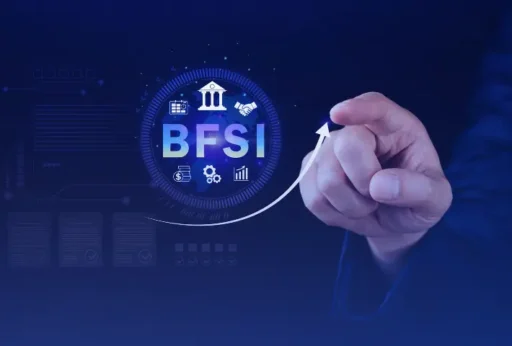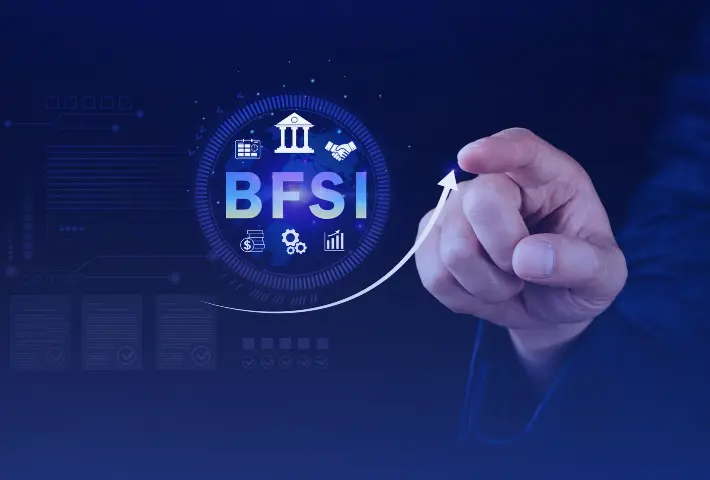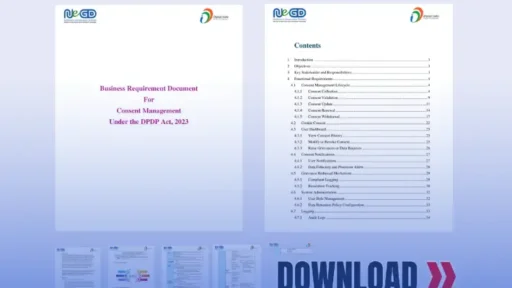The Indian financial ecosystem is rapidly evolving, and with digitization there is better customer engagement, better transaction processing, and service delivery on these transactions. However, with this evolution comes the responsibility to collect, store, process, and manage personal data in compliance with applicable law. The Digital Personal Data Protection Act (DPDPA), 2023 is the landmark data privacy law in India and it provides the framework on how personal data can and cannot be collected, stored, processed and shared. Therefore, BFSI organizations need consent managers to comply with the DPDPA.
Out of all the sectors dealing with personal data, the Banking, Financial Services, and Insurance (BFSI) sector may face some of the most complex hurdles under the DPDPA. Most financial institutions deal with financial records and Aadhaar numbers. They also handle other extremely sensitive personal information, such as health records and biometric data used for underwriting. Therefore, there are layers of complexity in meeting regulatory requirements for financial institutions. This is because the DPDPA requires explicit and auditable consent from the customer. It also demands proper process management to ensure that all consent, usage, and destruction workflows are being followed.
This blog will discuss the importance of Consent Managers for BFSI. It will identify what features organizations should look for. It will also provide a thorough list of some of the best consent management platforms available to financial services today. In addition, this blog will weave in key sector-specific terms such as “consent managers for banking services,” “consent managers for finance sector,” and “consent managers for insurance sector.”
Understanding BFSI: Who Falls Under This Sector?
The BFSI sector is a board range of companies that deal with financial goods and services. The BFSI sector consists of:
Banking Institutions
These companies include traditional and digital banks, authorized by the Reserve Bank of India (RBI) including public sector banks, private banks, cooperative banks, and new-age neo banks. Banks process numerous personal details throughout the various processes of account maintenance, lending, investments, and digital payments.
Financial Services Providers
This encompasses Non-Banking Financial Companies (NBFCs), Credit Bureaus, Loan Aggregators, Mutual Fund Platforms, Payment Gateways, Wealth Management Firms, and Fin-Tech (Financial Technology) companies. All these entities heavily rely on vast amounts of data. They use this data to create credit profiles, perform KYC (Know Your Customer), and make real-time financial decisions.
Insurance Companies
Life Insurance. Health Insurance, and General Insurance, fall under this category. Insurance companies have access to personal and sensitive health information, of which the DPDPA governs compliance; therefore, the strictest compliance requirements, with regard to data protection, will be imposed on Insurance companies
Now, each entity under BFSI has to demonstrate, that they not only collect consent from a user, but also prove, that consent is informed, purpose-related, and open to revoking consent at any time.
Why Consent Managers Are Essential for BFSI under DPDPA
The DPDPA requires that personal data can only be processed with consent that is valid, freely given, informed, specific and unambiguous. The BFSI landscape will be required to rethink how to interact with customers digitally, in a way that when data is captured, every instance of consent can be audited, withdrawn and tracked.
Legal Compliance and Avoiding Penalties
The BFSI sector companies that do not comply with the provisions of consent under the DPDPA may face non-compliance penalties, which can go into crores of rupees. The Act empowers the Data Protection Board to investigate complaints, audits, and impose penalties for non-compliance. A robust consent manager ensures that organizations have tamper-proof, time-stamped records to show that they are collecting and using data lawfully.
Reducing Operational and Regulatory Risks
Banks, NBFCs, and insurers typically deal with multiple data touchpoints—from mobile apps and websites to third-party integrations. Without a centralized consent management solution, it becomes difficult to track what data was collected, for what purpose, and for how long. Consent managers eliminate this fragmentation by offering a unified view of user permissions.
Enhancing Customer Trust and Data Transparency
Modern consumers are increasingly aware of their digital rights. By offering transparent and user-friendly consent mechanisms, BFSI players can build stronger relationships with customers. Features like multilingual interfaces, real-time consent withdrawal, and privacy notices reinforce user confidence and reduce the chances of complaints or legal escalation.
Sector-Specific Use Cases
Unlike generic consent management tools, consent managers related to banking services, finance platforms, and insurance companies are more complex in workflows, including things like consent for recurring payments, Aadhaar eKYC, digital signature and sensitive health disclosures. Specialised platforms have specific consent templates, and APIs, that handle these use cases.
Key Features to Look for in Consent Managers for BFSI
When choosing a consent manager, BFSI organizations should look beyond generic features and opt for solutions that can be seamlessly integrated into their existing digital infrastructure. Here are some must-have capabilities:
- Granular Consent Capture: Capacities for capturing consent for singular services (e.g. loan processing, insurance claims, third-party sharing) rather than blanket approvals.
- Real-time Consent Withdrawal: Users should have the option to revoke consent instantly via app or website and the backend processes should also be updated accordingly.
- Multilingual Interface: Consent forms could be made available in regional languages to address the diverse customer base in India.
- API-First Integration: Consent systems should be API-first to effortlessly integrate with core banking, CRM, lending, investment, and insurance systems.
- Tamper-proof Audit Trails: Each consent action should be recorded with time-generated stamps, and every access should also be recorded in order to provide a clear trail for auditing or to use in a legal situation where consent was challenged.
- Automatic Expiry and Purpose Limitation: The platform should be able to automatically purge or restrict access to the data when the purpose expires or the user takes back their consent.
- Role-Based Access and Encryption: Internal teams should only have access to data when they have a reasonable need to know; the data should be encrypted when stored and when transferred.
- Regulatory Compliance Reporting: Dashboards that would allow system users/admins to create compliance report summaries, breach logs, and provide summaries to regulators.
Top Consent Managers for BFSI in India
Here’s a curated list of trusted, India-ready consent managers that cater specifically to the needs of banks, NBFCs, FinTech platforms, and insurance providers:
1. Concur Consent Manager
Concur is one of the most versatile consent management solutions developed specifically for Indian businesses. With deep integration capabilities and a strong focus on multilingual, regional compliance, Concur stands out as a comprehensive solution for BFSI entities.
Key Features:
- Real-time consent management with dynamic workflows
- Custom templates for loans, savings accounts, insurance, and investments
- Multilingual interfaces supporting Hindi, English, and major regional languages
- Pre-integrated APIs for CRMs, lending engines, and digital banking apps
- Tamper-proof consent logs for legal audits and DPDPA compliance
Why It’s Ideal for BFSI: Concur’s ability to adapt to various BFSI use cases—whether it’s an insurance form, EMI application, or financial product consent—makes it an all-in-one solution for banks and financial service providers.
2. Consentin By leegality
Leegality, primarily known for digital documentation and eSign solutions, now provides an independent Consentin solution for digital personal data governance.
Key Features:
- Consent lifecycle management, including features for standardized consent notice design, multi-channel collection, and fulfilling data principal rights requests.
- Compliance and privacy solutions for seamless data protection through automated risk management, support for advanced assessments along with reporting and analytics.
- Data discovery and data lifecycle management through automated mapping and protocols.
- Third-party data risk management solutions.
3. CoTrust by Digio
CoTrust is a powerful product from Digio, a company already trusted for Aadhaar-based services and eSign integrations. This consent manager offers seamless authentication workflows with consent capture at multiple customer interaction points.
Key Features:
- Aadhaar and mobile OTP consent capture for onboarding
- Audit-ready logs and dashboards for financial regulators
- Integration with eSign and eStamping for secure documentation
- Consent lifecycle management tailored for loans, policies, and KYC
Perfect for digital lenders, insurance companies, and investment platforms that require eKYC-compliant consent with strong authentication layers.
4. Redacto
Redacto is a privacy-first platform offering highly configurable consent management tools suitable for institutions that need granular control and deep analytics over customer permissions.
Key Features:
- Custom workflows based on data types (health, financial, credit)
- Easy integration with legacy systems via RESTful APIs
- Real-time segmentation and tagging of user consents
- Visual dashboards for compliance teams and auditors
Mutual funds, credit agencies, or insurers who want fine-grained visibility into how each customer’s data is used, for what purpose, and where it flows.
5. Sequrite CMP
Sequrite Consent Management Platform (CMP) offers end-to-end encryption and bank-grade security features. It’s ideal for BFSI institutions with complex data architectures.
Key Features:
- Secure consent collection across multiple digital assets
- Federated consent management across business units
- Strong access controls and SOC 2-compliant architecture
- Dynamic expiration rules based on regulatory timeframes
Large banks and NBFCs managing millions of user records with high regulatory exposure and need for operational scalability.
BFSI Data Practices with the Right Consent Manager
As data privacy regulations become standardized practice, the BFSI institutions in India must now begin to take active steps to align with the DPDPA. Consent is no longer just a legal checkbox. It is at the base of responsible data governance. The BFSI sector must recognize the importance of consented consent, as it processes financial and biometric information.
The recommended CMP for BFSI is Concur Consent Manager. It has the most functionality and is the most BFSI-friendly solution. Having a strong localized solution with multi-language support and various integrations with financial systems, Concur stands out. It also includes built templates for banking, lending, and insurance workflows. Concur has been purpose-built specifically for the Indian Financial Services Economy.
Other solutions like CoTrust by Digio, Redacto, Sequrite CMP, and Consentin by Leegality have very useful features. They also offer specific strengths relevant to our sector. Each can provide great unique value for you. This depends on whether you are looking for Aadhaar eSign workflows, consent analytics, enterprise-level security, or high-volume documentation.
Don’t wait until enforcement begins – the time to prepare is now – book a demo with Concur or the best-fit solution for your company today.
Disclaimer: The information provided in this blog is based on publicly available sources and general internet research. It does not imply any endorsement, certification, or official recognition by the Government of India, the Data Protection Board, or the companies mentioned under the Digital Personal Data Protection Act (DPDPA), 2023. The features, capabilities, and functionalities described for each consent management platform are subject to change and may vary from the actual product offerings. Readers are strongly encouraged to independently verify all details and consult with legal, compliance, or data protection professionals before making any decisions. The consent management platforms listed in this blog are arranged in alphabetical order, and not ranked by performance, quality, or preference.








